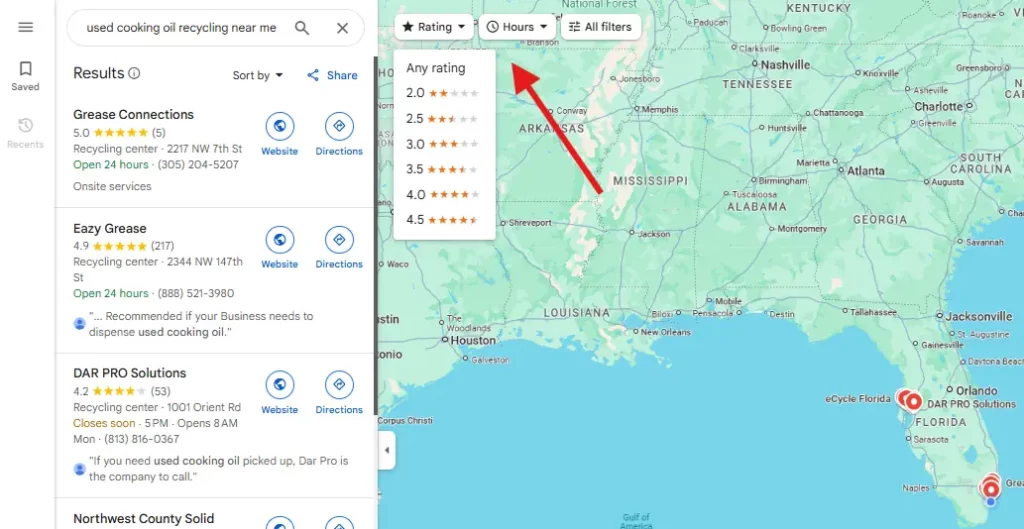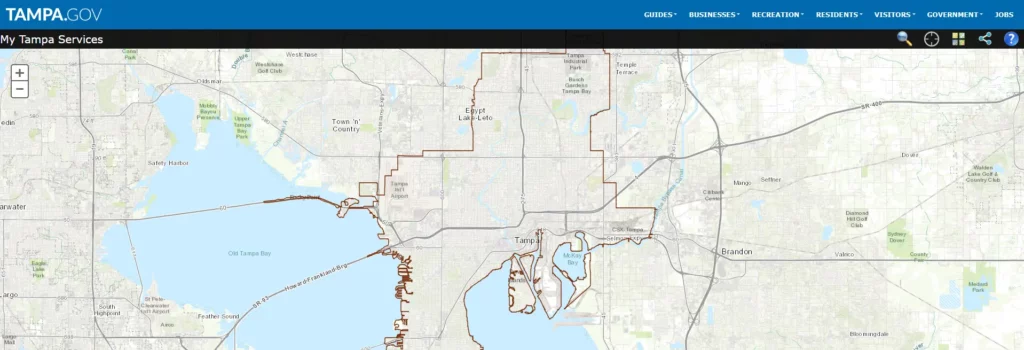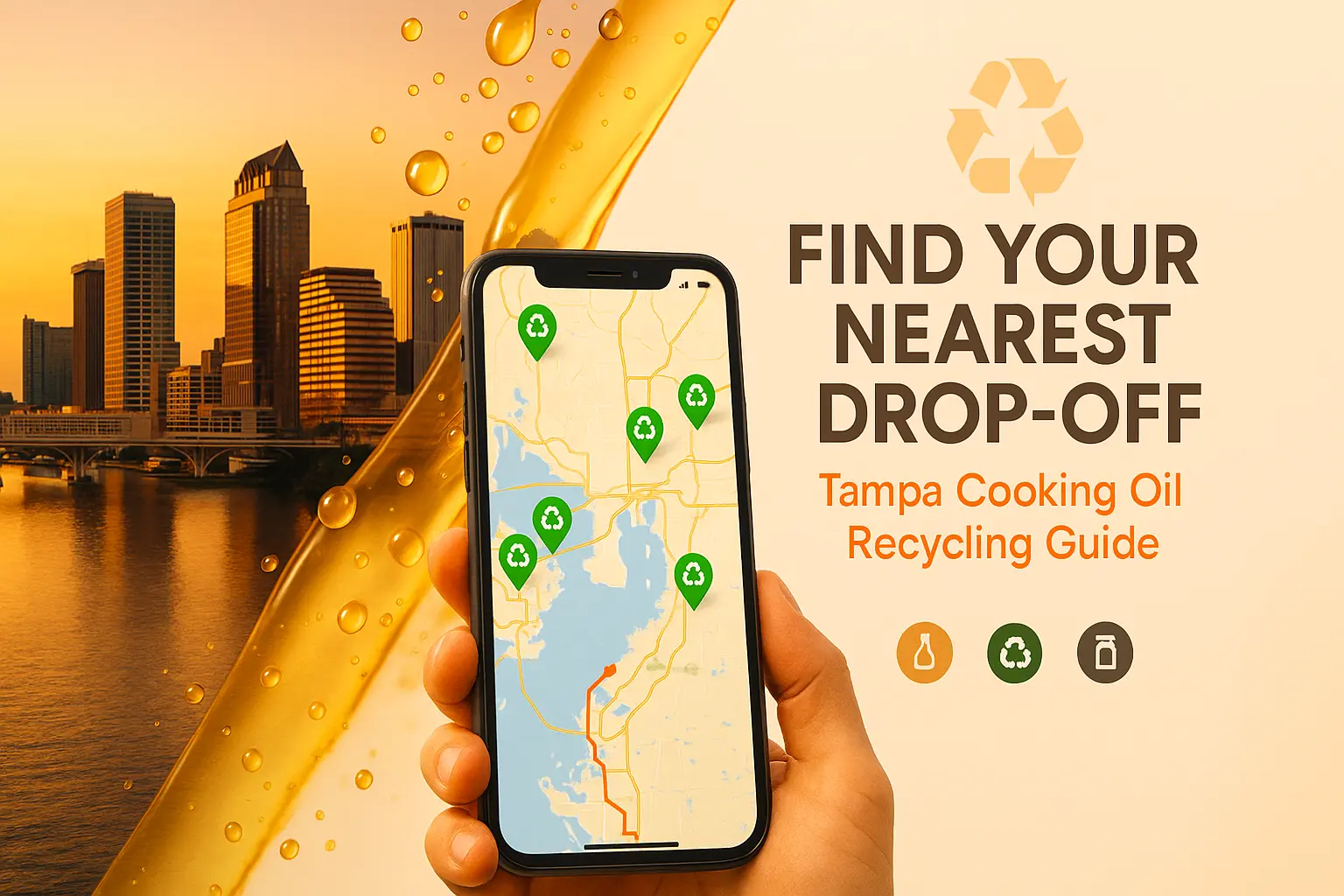Table of Contents
Introduction: Tampa’s search for the closest drop off
Picture this: brunch is over, the fryers are cooling, and you’re staring at a jug of used oil you can’t pour down the drain without risking a plumbing nightmare; or a city fine. If that sounds familiar, you’re far from alone. Greater Tampa; home to more than 4,000 food‑service businesses and tens of thousands of backyard fry enthusiasts; generates millions of gallons of waste oil each year. Luckily, Hillsborough County has built a network of public drop off stations, private haulers, and specialty recyclers that turn yesterday’s french fry fuel into tomorrow’s biodiesel.
This guide walks you through exactly how to find the nearest collection site in Tampa, how to prep your oil for the trip, and what to do if you’d rather let a service such as Grease Connections pick it up curbside. We’ll keep jargon to a minimum, point you to free tools you already have on your phone, and answer the questions local restaurant owners, food‑truck operators, and eco‑minded home cooks ask most. By the end, you’ll know:
- Where city‑run “Household Hazardous Waste” depots sit on the map.
- Which hours they really keep (spoiler: it’s often Saturday mornings only).
- How to use Google Maps filters and the FOG (Fats, Oils, Grease) layer inside Hillsborough’s GIS portal to spot an approved station within seconds.
- The three mistakes that get DIY recyclers turned away at the gate—and how to avoid them.
So grab that sealed container of oil, open your favorite map app, and let’s get you from “Where can I dump this?” to “Done; what’s for dinner?” in about five minutes.
Why responsible oil disposal matters in Tampa
Tampa Bay’s storm‑water system is a maze of 2,100 miles of underground pipe that empties directly into the Hillsborough River and Old Tampa Bay. One gallon of liquid oil can coat the surface area of an Olympic pool and choke local seagrass beds. That’s why the City of Tampa enforces strict FOG ordinances (§26‑150) and why code inspectors hand out fines up to $2,000 per violation.
Beyond eco impacts, poor disposal hits your wallet. Clogs send plumbers charging by the hour, while code citations arrive with mandatory re‑inspection fees. Recycled oil, on the other hand, becomes feedstock for biodiesel refineries in Mulberry and Port Tampa, displacing fossil diesel and lowering regional greenhouse‑gas emissions by as much as 86 percent. In short, good disposal:
- Protects bay waterways: Critical for fishing, tourism, and flood control.
- Keeps you legal: Meeting Hillsborough County FOG discharge limits.
- Turns waste into revenue: Recyclers pay up to $0.40 per gallon for clean, filtered vegetable oil.
Whether you run a restaurant in Ybor City, fry mullet at home, or manage concessions at Raymond James Stadium, tapping the city’s approved recycle stream is the quickest route to saving cash and protecting Tampa’s coastal backyard.
Mapping your options: drop offs, curbside pickups, and Grease Connections
Tampa offers three main pathways:
- Public HHW sites – Hillsborough County’s Solid Waste Management operates mobile collection events and a permanent East Lake facility at 6209 C.R. 579. These accept up to five gallons per household at no charge. Bring ID and proof of residence.
- Private drop‑off stations – Companies such as Bay Biodiesel Depot on Adamo Drive and EcoGrease Recycling near Town ‘N Country accept commercial quantities. Expect to sign a manifest and receive a rebate based on volume and quality.
- Full service pickup (Grease Connections) – Ideal for restaurants, industrial facilities and food trucks who can’t spare staff time. We deliver sealed 70 gallon caddies or 300 gallon outdoor tanks, track fill level, file your FOG paperwork, and cut a quarterly rebate check; zero lift on your end.
Each option meets state environmental rules, but the right choice depends on volume, schedule, and how hands on you want to be. Home cooks? Public depots win. Medium‑volume caterers? A drive through drop off before noon service does the trick. High volume fry houses? Outsource and forget it.
Using digital tools to locate the nearest station
Google Maps quick search

- Open Maps, type “used cooking oil recycling near me.”
- Tap Filters → Rating 4★ & up to surface reputable collectors.
- Zoom until Tampa’s grey neighborhood labels appear; icons refresh in real time.
Hillsborough County Web APP layer

- Visit https://apps.tampagov.net/mygovtsvcs_webapp/ on desktop.
- Check the box labelled Grease Disposal Sites.
- Click any green droplet for address, hours, phone, and accepted quantities.
Grease Connections pickup scheduler
- Head to https://greaseconnections.com/services/used-cooking-oil-pickup-near-me/ on mobile.
- Enter ZIP and estimated gallons per month.
- Get instant availability plus rebate rate.
Pro tip: Create a custom “Oil Drop” list inside Google Maps so you can one‑tap directions from anywhere in the city.
Preparing your oil for safe transport
Clean, cool, and contained—three words that keep depot staff smiling and your rebate high.
- Cool – Let oil reach room temperature. Hot oil melts thin plastic and can splash during transit.
- Strain – Pour through a metal sieve or coffee filter to remove fries, batter, and rogue onion rings. Particles lower rebate rates and clog refinery equipment.
- Contain – Use a sturdy, screw‑top container. Food‑grade buckets or the jug your frying oil arrived in work perfectly. Avoid glass; county sites reject it.
- Seal & label – Write “USED COOKING OIL – VEG” with a marker. Mixed animal fat? Note it; different end uses.
- Transport upright – Place containers in a milk crate or shallow bin to catch drips. Keep away from sharp objects in your trunk.
Commercial kitchens using our service can skip these steps; our caddies include splash‑proof lids and built‑in strainers. For everyone else, five minutes of prep means quicker depot check‑in and better payouts.
Four FAQs Tampa readers ask
Do Tampa depots take motor oil too?
No. Used motor oil follows separate rules. Mixing cooking and motor oil contaminates the batch and leads to refusal.
What if my fryer oil has water in it?
Small amounts (< 5 %) are acceptable, but expect a lower rebate. For larger contamination, leave the container open overnight so water settles, then decant the clear oil.
Can renters use county HHW sites?
Yes—bring a utility bill or lease copy with your photo ID to prove Hillsborough residency.
How much could my restaurant earn?
A mid‑size kitchen producing 200 gallons per month at $0.35/gal nets about $2,800 per year; enough to offset grease‑trap pumping costs.
Wrap‑up & next steps
Finding the nearest Tampa cooking oil drop off takes only a map app and a clean jug, but if you’d rather keep staff on the line and focus on customers, Grease Connections can make the problem disappear; containers, pickups, manifests, even rebate payments handled in one shot. Either way, every gallon you recycle keeps Tampa’s waterways clear, your plumbing flowing, and your bottom line healthier.
Still have a question? Drop us a note or call 888‑826‑0201. We’ll point you to the closest depot or schedule your first pickup; whatever makes life easier.









